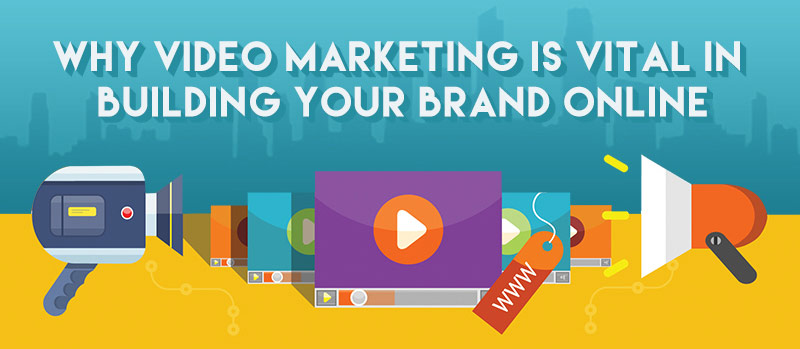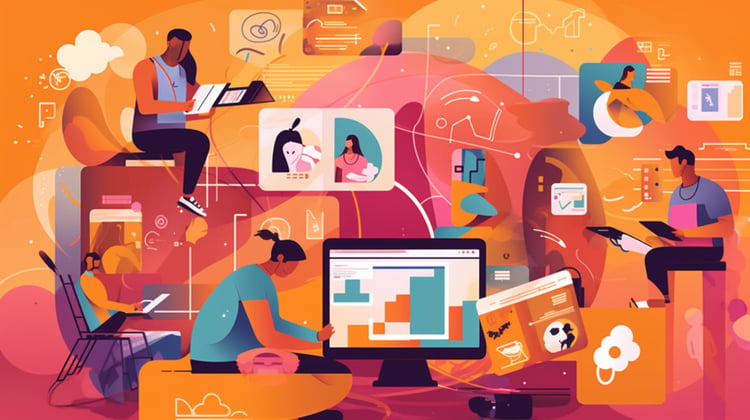The Increasing Importance of Video Marketing in Today's Digital Landscape
- Home
- The Increasing Importance of Video Marketing in Today's Digital Landscape

In the constantly evolving realm of digital marketing, leveraging video marketing strategies and AI technology has become critical for enhancing brand visibility, driving customer engagement, and generating leads. This in-depth guide offers tech/software Marketing Managers essential insights into harnessing video marketing, AI-powered marketing tools, and ROI-boosting strategies. Packed with actionable tips, the latest industry trends, and forward-thinking AI solutions, we aim to empower you with the knowledge to navigate the digital marketing landscape effectively and stay ahead of the competition.
The Increasing Importance of Video Marketing in Today's Digital Landscape

As a savvy Marketing Manager in the tech industry, you already know that keeping pace with digital trends is essential. One such trend that's been growing in importance is video marketing. Not only does it leverage our natural inclination towards visually engaging content, but it also provides a versatile medium for storytelling, allowing brands to connect more authentically with their audience.
Video marketing has become a cornerstone of digital strategy, providing a powerful way to engage audiences and promote brand messaging. Today, it's not just a nice-to-have; it's a must-have. In fact, according to a 2023 report by HubSpot, 86% of businesses use video as a marketing tool, up from 63% in 2017.
Consumption trends back this up too. Data from Cisco's Visual Networking Index predicts that by 2024, video will account for 82% of all internet traffic. Moreover, according to a study by Wyzowl, 84% of people say that they've been convinced to buy a product or service by watching a brand's video. These figures indicate just how integral video content has become in the consumer decision-making process.
Let's illustrate this with a real-world example. Consider TechSolutions, a software company that recognised the power of video marketing early on. With a limited budget and resources, they needed a cost-effective way to increase their brand visibility and generate qualified leads. Enter their 'Tech Explained' video series.
This series, hosted on their website and promoted across their social media platforms, offered short, easy-to-understand videos demystifying complex tech concepts. The result? They experienced a 60% increase in website traffic, with visitors spending an average of 2.5 minutes longer on their site. Moreover, they saw a significant boost in leads, with the video content contributing to a 30% increase in demo requests.
The takeaway here is that video marketing isn't just a fleeting trend; it's a key tool for driving engagement, conversion, and ultimately, business growth. For Marketing Managers in the tech industry, understanding and leveraging this medium is a must, especially in an increasingly competitive digital landscape.
The Impact of Video Marketing on Brand Engagement and Lead Generation
The Power of Video Marketing
With attention spans dwindling and information overload being the norm, marketers need to find ways to cut through the noise. That's where video marketing shines, offering dynamic and engaging content that grabs and retains audience attention. This isn't just conjecture; it's backed by data.
According to a survey by Brightcove, 53% of consumers engage with a brand after viewing a video on social media. Not only does it capture attention, but video content also builds an emotional connection with viewers, allowing brands to tell their stories in a more compelling and relatable way. It’s this combination of engagement and connection that ultimately drives brand awareness.
Beyond awareness, the video also plays a critical role in lead generation. A report by Aberdeen Group shows that companies using video content achieve a 34% higher web conversion rate than those not using video. With the right content and a well-defined target audience, video can guide prospects through the sales funnel and encourage them towards conversion.
The Benefits of Video Marketing in the Tech/Software Industry
For businesses in the tech/software industry, video marketing offers several distinct advantages. Let’s consider a few:
Demonstrating Complex Products/Services: Videos can simplify and demonstrate complex products, software, and processes in a digestible way. For instance, Salesforce has successfully used explainer videos to illustrate the benefits of their CRM software, significantly aiding their lead generation efforts.
Showcasing Customer Testimonials: Videos of customer testimonials can enhance credibility and trust. Microsoft, for example, leverages customer story videos to provide real-world examples of how their products make a difference.
Boosting Social Engagement: Videos shared on social media can increase engagement levels and expand reach. Adobe, for instance, frequently shares short, visually engaging videos on Instagram that resonate with their creative target audience, promoting brand engagement and potential lead generation.
Video marketing is a potent tool for tech/software businesses to increase brand engagement and drive lead generation. By delivering complex information in an engaging, relatable format, videos can help tech brands effectively connect with their audience and guide them towards conversion.
Harnessing AI in Video Marketing for Improved ROI and Efficiency
The Role of AI in Digital Marketing
Artificial Intelligence (AI) has steadily become a game-changer in digital marketing. As Marketing Managers in the tech/software industry, you're undoubtedly aware of how AI is transforming marketing dynamics, enabling personalised experiences, predictive analytics, and automated workflows. Its potential to revolutionise marketing strategies extends into the realm of video marketing as well.
The Power of AI in Video Marketing
AI can significantly enhance the efficiency and effectiveness of video marketing, enabling automation and optimization at every stage. From streamlining video creation to personalising video content and simplifying distribution, AI is making video marketing more accessible and impactful.
Let's consider video creation. Advanced AI tools, such as AI video editing software, automate the video editing process, allowing even those with limited resources or skills to create high-quality, engaging videos. These tools can analyse the video content, recommend optimal edits, and even automatically generate subtitles, making the process much more efficient.
Beyond creation, AI is transforming video personalisation. AI algorithms can analyse vast amounts of data to understand individual viewer preferences, allowing for the delivery of personalised video content that resonates more strongly with the viewer and, in turn, drives engagement and conversion.
When it comes to distribution, AI can optimise when and where your videos are shown, ensuring they reach your target audience at the right time and on the right platform, further improving engagement and ROI.
AI Tools for Video Marketing
Several AI tools are available to help you harness these benefits. Platforms like Magisto and Wibbitz use AI to simplify video creation and editing. Brightcove uses AI to provide video analytics, allowing you to understand viewer behaviour and optimise your content accordingly. Vidyard and TwentyThree, meanwhile, use AI to personalise video content and optimise video distribution.
AI-Powered Video Marketing: A Solution to Budget Constraints
For Marketing Managers with budget constraints, AI-powered video marketing offers a promising solution. By automating and optimising processes, AI not only saves time and resources but also maximises marketing ROI. Businesses can create more videos of higher quality and better relevance, leading to increased engagement, lead generation, and ultimately, higher sales.
AI represents a powerful tool for enhancing video marketing strategies, enabling marketers to create higher quality content, personalise user experiences, and optimise distribution, all while reducing costs and improving ROI. It's a development that no tech/software Marketing Manager can afford to ignore.
The Future of Video Marketing: AI and Multichannel Optimization
AI in Multichannel Marketing Integration
As Marketing Managers, ensuring the seamless integration of your video content across various marketing channels is a significant part of your role. This is where AI can be your ally. AI can help automate and optimise the distribution of video content across multiple channels, ensuring that the right content reaches the right audience on the right platform. AI-powered tools can analyse the unique characteristics of each channel, tailoring video content accordingly to maximize engagement and conversion rates.
Tracking and Analysing Video Performance with AI
Measuring the performance of your video content is equally crucial. AI offers advanced capabilities in this regard, capable of tracking and analysing video performance across different platforms. AI-powered analytics tools can provide insights into viewer behaviour, video engagement metrics, and conversion rates, enabling you to optimise your video content and distribution strategy based on data-driven insights.
For example, heat map analytics can show you which parts of your video are capturing the most attention or causing drop-offs, enabling you to tweak your content for better engagement. Similarly, AI can help identify which channels are generating the highest ROI, helping you allocate your marketing resources more effectively.
Future Implications and Potential Challenges
Looking ahead, the integration of AI in video marketing holds vast potential. We anticipate advancements in AI technology that will offer even more sophisticated video personalisation, improved audience targeting, and smarter content distribution. Moreover, as AI technology becomes more accessible and affordable, smaller businesses with budget constraints will also be able to leverage its power for their video marketing efforts.
However, this future is not without its challenges. As we increasingly rely on AI, issues like data privacy, algorithm bias, and the need for human oversight come to the forefront. Ensuring that AI is used responsibly and ethically in video marketing will be a critical consideration.
Nevertheless, the benefits that AI offers in video marketing far outweigh the potential hurdles. Embracing this evolving landscape and preparing for these changes now will position tech/software companies for success in the ever-evolving digital marketing realm. The key lies in staying informed about AI advancements, understanding their implications, and adapting your strategies accordingly.
Key Takeaways and Next Steps for Tech/Software Marketing Managers
The Changing Digital Landscape
As we've explored in this article, the digital marketing landscape is rapidly evolving, with video marketing and AI taking centre stage. The power of video to engage audiences and generate leads is undeniable. Coupled with the automation, personalisation, and multichannel optimization offered by AI, these tools are revolutionizing the way businesses connect with their audiences.
Moreover, as the future unfolds, the influence of video marketing and AI in shaping the digital landscape will only continue to grow. As such, they represent crucial areas for tech/software Marketing Managers to understand and leverage.
Practical Steps for Implementation
So, how can you integrate video marketing and AI into your own strategies? Here are a few practical steps:
Start Small: Begin by incorporating video content into your current marketing strategy. This could be as simple as creating a video introduction for your brand or using video to explain complex concepts.
Explore AI Tools: Experiment with different AI tools designed for video marketing. These could include video editing software, video analytics tools, or video distribution platforms. See which ones best meet your specific needs and objectives.
Personalise Your Content: Use the data at your disposal to personalise your video content. Remember, personalised content resonates more strongly with audiences and drives engagement.
Measure and Optimize: Regularly track and analyse the performance of your videos. Use these insights to continually optimise your content and distribution strategy.
Stay Informed and Keep Learning
Finally, as a tech-savvy marketing professional, it's important to stay informed about the latest digital marketing trends and best practices. The landscape of video marketing and AI is constantly changing, with new technologies, tools, and tactics emerging all the time.
Keep an eye on industry news, attend relevant webinars and conferences, and network with other professionals in the field. By staying at the forefront of these developments, you'll be well-equipped to adapt your strategies and keep your marketing efforts effective and competitive.
In conclusion, video marketing and AI represent the future of digital marketing. As a tech/software Marketing Manager, understanding and leveraging these tools is crucial for your brand's success. So why wait? Start exploring the power of video marketing and AI today, and see the difference it can make for your business.
FAQ Section
1. What is the role of video marketing in the tech/software industry?
Video marketing plays a crucial role in the tech/software industry by boosting brand awareness, increasing engagement, and generating qualified leads. It enables companies to deliver complex information in an engaging, digestible format.
2. How can AI enhance video marketing strategies?
AI can automate and optimize various aspects of video marketing, from video creation and editing to personalization and distribution. It can also provide advanced analytics, enabling marketers to track and optimize video performance based on data-driven insights.
3. What AI tools are recommended for video marketing?
Several AI tools can enhance video marketing, including AI-based video editing software like Magisto and Wibbitz, analytics platforms like Brightcove, and video distribution and personalization tools like Vidyard and TwentyThree.
4. How can AI help manage budget constraints in video marketing?
By automating and optimizing various aspects of video marketing, AI can save time and resources, allowing even businesses with limited budgets to create high-quality, effective video content. Additionally, AI can maximize marketing ROI by ensuring videos reach the right audience at the right time on the right platform.
5. What are some practical steps to incorporate video marketing and AI into my marketing strategy?
Start by incorporating video content into your existing marketing efforts. Explore different AI tools to see which ones meet your needs, use data to personalize your content, and regularly track and analyze video performance to optimize your strategy.
6. What are some potential challenges with AI in video marketing?
As with any technology, AI poses potential challenges such as data privacy concerns, algorithm bias, and the need for human oversight. However, these challenges can be managed with the responsible and ethical use of AI technology.
Engage your potential customers much better with video marketing. Fill out the form and contact us now at 020 8834 4795 for a consultation!






